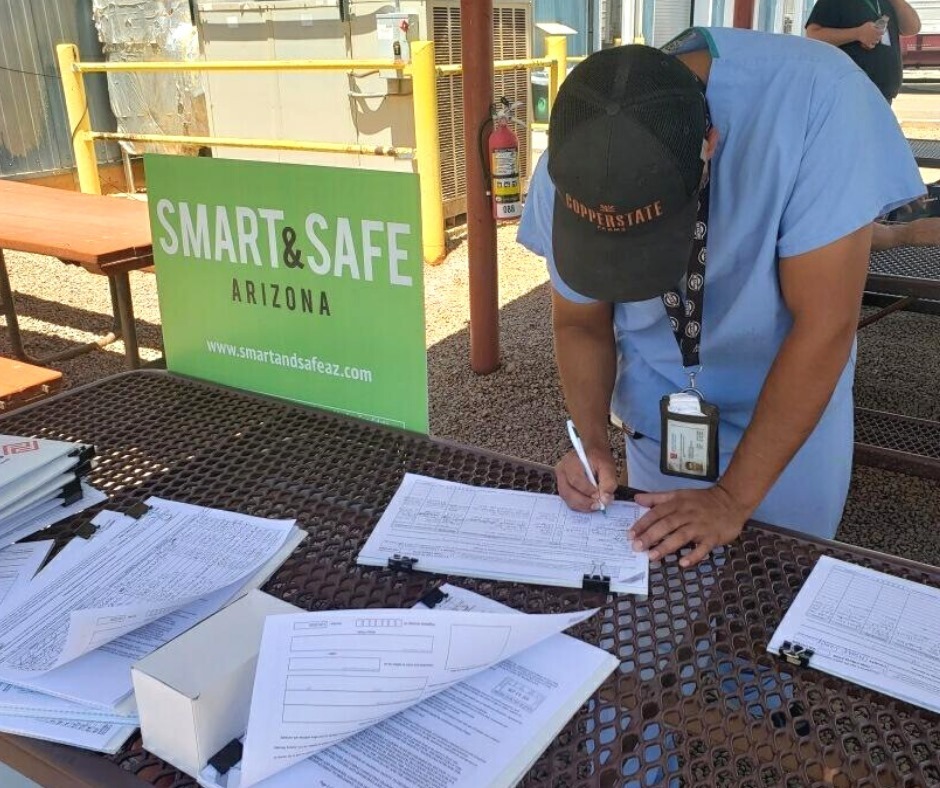Political Report
Four States Could Legalize Marijuana Next Month
Of the four, only Arizona’s initiative would directly tackle racial justice and invest in communities harmed by drug enforcement laws.

Of the four, only Arizona’s initiative would directly tackle racial justice and invest in communities harmed by drug enforcement laws.
Ballot initiatives in Arizona, New Jersey, South Dakota, and Montana are seeking to legalize cannabis for recreational use. These states are aiming to raise revenue and reverse the effects of the war on drugs on marginalized communities.
Drug reform advocates say that racial justice should be central to legalization efforts.
“Cannabis criminalization is a cornerstone of the war on drugs,” Jared Moffat, campaigns coordinator at the Marijuana Policy Project, told The Appeal: Political Report. According to the Pew Research Center, 40 percent of all drug arrests in 2018 were marijuana-related, down from 52 percent in 2010. The overwhelming majority were for possession, as opposed to sale or manufacture.
“People of color are arrested at far higher rates for marijuana possession than white people,” Moffat says, “and that’s not due to any difference in usage. That’s just due to a racist policy.”
If the cannabis legalization measures pass, they would accelerate a shift in drug policy that has quickly evolved since Colorado and Washington became the first states to legalize marijuana in 2012. Now 11 states and the District of Columbia allow recreational use of cannabis, and medical marijuana is legal in 33 states. South Dakota and Mississippi voters also have the chance to approve medical marijuana legalization this election cycle. And other drug reforms are on the ballot in Oregon, where voters will decide whether to decriminalize possession of illegal drugs by replacing criminal penalties with fines, and whether to legalize psilocybin therapy.
But when it comes to making amends for racial injustice, this year’s marijuana legalization measures vary. Only Arizona’s initiative includes provisions to ensure that communities harmed by drug criminalization benefit financially from legalized cannabis.
Arizona has particularly harsh marijuana laws; possession of even a small amount of cannabis is a felony punishable by up to two years in prison. Since incarceration can become a barrier to employment, education, housing, and even the right to vote, one marijuana conviction can upend people’s lives—especially people from marginalized communities.
Black people in Arizona are three times as likely as their white counterparts to be arrested for marijuana possession. Despite only making up 5 percent of the state’s population, Black Arizonans comprise 18 percent of those in jail and 14 percent in prison.
Arizona’s Proposition 207 would legalize possession of up to one ounce of cannabis for adults over the age of 21.
It would also allow people with past cannabis convictions to apply to have their records expunged. Everyone who applies would be presumed qualified unless proved otherwise, according to Stacy Pearson, a spokesperson for Smart and Safe Arizona, the campaign promoting Proposition 207. “We’ve given money to community organizations to process expungements on behalf of folks in that system,” Pearson told The Appeal. “The onus is on the prosecuting agency to petition to the court why this person wouldn’t qualify.”
Arizona’s cannabis initiative would place a 16 percent tax on marijuana sales, which would fund social services as well as a social equity ownership program to help those with past marijuana convictions get licenses to produce and sell their own cannabis.
But the majority of early priority licenses for recreational cannabis would go to existing medical dispensaries. Only 26 out of 160 licenses would be reserved for social equity applicants and rural counties without a dispensary, according to Pearson.
Advocates have pointed out similar shortcomings in other states that have legalized recreational marijuana; Illinois is considered to have the most robust social equity program, but people who qualify still struggle to secure enough capital to start a business. Other states that have legalized marijuana have also put in place social equity provisions, setting precedents to build upon.
In New Jersey, social equity is not factored into the state’s marijuana initiative, though it was a sticking point in the legislative battle that led to the referendum. New Jersey’s initiative doesn’t specify regulations beyond tax limits, so other details would be worked out by the state’s Cannabis Regulatory Commission if it passes. Advocates plan to push for social equity provisions in that process. R.Todd Edwards, the political action chairperson of the New Jersey NAACP, told the New York Times: “If this passes and we are not at the table, it will have been a big hoax.”
Social equity provisions are also absent from South Dakota’s cannabis initiative, even though the state has the highest arrest rate for marijuana possession in the nation. Black people in South Dakota are five times more likely than white people to be arrested on those grounds. Yet funds from a 15 percent cannabis tax would only go toward public schools and the state’s general fund. Similarly, in Montana, a 20 percent recreational marijuana tax would fund a variety of social services, including substance use programs, veterans’ services, and healthcare.
Some drug policy reform advocates take issue with placing high taxes on cannabis.
“It’s like robbing Peter to pay Paul,” said Deborah Small, executive director of Break the Chains, a California-based organization that aims to change drug policies. “It gives cities and local governments the green light to impose whatever taxes that they want.” Small also said that high cannabis taxes may make cannabis inaccessible to those from low-income households which, in some cases, could drive them back into illicit drug markets.
Small made the case that the best way to make legalization more beneficial for everyone is to develop specific plans for investing in communities that have borne the brunt of marijuana criminalization . “Use the proceeds to actually reinvest in communities that were disinvested in because of drug war enforcement,” she said.
